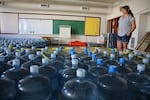Federal lawmakers this week considered drinking water problems in rural Oregon as prime examples of a national crisis.

Volunteer Emergency Manager Dorothea Thurby of Warm Springs takes inventory of bottled water Aug. 2, 2019.
Emily Cureton / OPB
At a Senate subcommittee hearing Wednesday, Oregon Democratic Sen. Ron Wyden rattled off a list of Oregonians struggling to meet basic water needs. He mentioned dry wells in Southern Oregon, polluted groundwater in Eastern Oregon and Central Oregon, and years of boil water notices on the Warm Springs Reservation.
Wyden called on several federal agencies to collect national data on who doesn’t have safe water and direct more funding toward rural residents and Tribes.
“It’s hard to believe that in 2023 our country doesn’t even have some basic facts about the key issues to improve water quality, like who has indoor plumbing in America that actually works,” he told members of the Senate Energy and Natural Resources Committee.
The hearing was part of a series of water-focused talks promoted by Oregon senators this month. Confederated Tribes of Warm Springs Chairperson Jonathan W. Smith traveled across the country to testify.
People on the reservation have endured years of water outages as they await the completion of a new, $24 million water treatment plant. Even when it’s built, the new plant won’t prevent boil water notices prompted by many other infrastructure failings, such as miles of crumbling pipes.
Smith said drought and pollution from cities and farms also make it harder to use the reservation’s water supply.
“We rely on Deschutes River as our source of drinking water,” Smith said, “But we are downstream from rapidly growing communities like Bend and Redmond, as well as thousands of acres of irrigated agriculture. As a result, our drinking water quality is impaired.”
Smith urged lawmakers to prioritize funding for river conservation. He also said federal agencies often require tribes to share as much as half the cost of big-ticket projects, which makes it hard to use federal funding at all.
Wyden pressed a senior Department of the Interior official to say whether any of some $550 million lawmakers recently allocated to that agency for water infrastructure would be used to help people in Warm Springs and the Klamath Basin.
“As the program is still under development, those are ideas that we’re willing to take into consideration,” replied Michael Brain, an Interior deputy assistant secretary who specializes in water.
Wyden also singled out the failings of Oregon state water managers.
“In my state and across the county, one person is in charge of managing water quality, one person is managing water quantity, and another is looking at affordability,” Wyden said.
“Sometimes one hand doesn’t know what the other hand is doing … This needs to be fixed.”
The senator asked the Environmental Protection Agency, the United States Department of Agriculture, and the DOI to work together to collect more data to show where investment is most needed.
